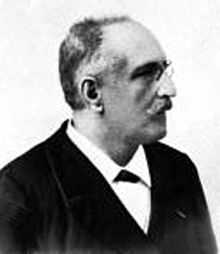Gaston Tarry

Gaston Tarry
Gaston Tarry (September 27, 1843 - June 21, 1913) was a French mathematician. Born in Villefranche de Rouergue, Aveyron, he studied mathematics at high school before joining the civil service in Algeria.
He pursued mathematics as an amateur, his most famous achievement being his confirmation in 1901 of Leonhard Euler's conjecture that no 6×6 Graeco-Latin square was possible.[1][2][3][4]
See also
- List of amateur mathematicians
- Prouhet-Tarry-Escott problem
- Tetramagic square
- Thirty-six officers problem
References
- ↑ From Latin Squares to Sudoku:A History of Magic Numbers
- ↑ 36 Officer Problem
- ↑ Tarry, Gaston (1900). "Le Probléme des 36 Officiers". Compte Rendu de l'Association Française pour l'Avancement de Science Naturel (Secrétariat de l'Association) 1: 122–123.
- ↑ Tarry, Gaston (1901). "Le Probléme des 36 Officiers". Compte Rendu de l'Association Française pour l'Avancement de Science Naturel (Secrétariat de l'Association) 2: 170–203.
External links
- O'Connor, John J.; Robertson, Edmund F., "Gaston Tarry", MacTutor History of Mathematics archive, University of St Andrews.
- Weisstein, Eric W., "36 Officer Problem", MathWorld.
|